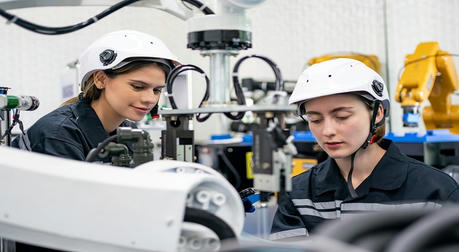-

-
 Vocational Training
Vocational TrainingAI and Automation how Vocational Training is Evolving
As artificial intelligence (AI) and automation reshape industries around the world, the demand for a new generation of skilled workers is growing rapidly. No longer confined to traditional tools and trades, vocational training programs are evolving to meet the needs of a tech-enabled future—preparing students for careers in robotics, CNC machining, advanced manufacturing, and automated systems.
In 2025 and beyond, vocational education is no longer just about plumbing and welding (though these are still in high demand). It’s about blending hands-on skill with high-tech know-how—making trade schools more relevant, future-focused, and essential than ever.
-
 Vocational Training
Vocational TrainingApprenticeships vs. Internships What’s the Real Difference?
When it comes to gaining work experience and breaking into a new career, two common paths are apprenticeships and internships. While many people think of them as similar, the reality is that they are fundamentally different in structure, purpose, and long-term benefits.
If you're a student, job seeker, or career changer, understanding the key differences between apprenticeships and internships can help you choose the right path for your goals.
-
 Vocational Training
Vocational TrainingGovernment Grants and Free Programs how to Train Without Student Debt
For many people, the rising cost of education is one of the biggest barriers to starting a new career. Student loans can take years to repay, and not everyone can afford traditional college or university programs. Fortunately, across many countries, governments are offering grants, subsidies, and free training programs that allow people to gain practical skills—without getting into debt.
-
 Vocational Training
Vocational TrainingHow Vocational Training is Closing the Skills Gap in 2025
In recent years, the global workforce has undergone a dramatic transformation. With industries evolving at a rapid pace and traditional four-year degrees no longer being the only ticket to career success, vocational training has emerged as a powerful solution to close the ever-widening skills gap.
As we enter 2025, countries around the world are investing more heavily in vocational education to meet the increasing demand for skilled workers in sectors such as healthcare, construction, manufacturing, logistics, and information technology. This article explores how vocational training is bridging the skills divide and providing real opportunities for individuals to enter the workforce quickly, affordably, and confidently.
-
 Vocational Training
Vocational TrainingOnline vs. On-Campus Vocational Programs Which is Better for You?
In today’s fast-changing job market, vocational training has become an essential path to career success. Whether you're looking to become a pharmacy assistant, welder, IT technician, or personal support worker, vocational programs offer targeted, skills-based education that prepares you for the workforce—fast. But there’s one key decision every student must make before starting: Should you choose an online or an on-campus vocational program?
This article explores the pros and cons of both options, comparing them across four key areas: flexibility, cost, learning outcomes, and certification recognition.
-
 Vocational Training
Vocational TrainingShort-Term Training Programs That Lead to Fast Employment
In today’s fast-changing job market, a four-year degree isn’t the only way to secure a stable, high-paying job. More and more people are turning to short-term training programs—lasting just 3 to 6 months—to launch rewarding careers without the long wait or heavy debt. These programs are practical, affordable, and designed to lead directly to employment in growing industries.
Whether you're looking to switch careers, re-enter the workforce, or boost your income fast, here are some of the top certificate programs that can help you land a job in under a year.
-
 Vocational Training
Vocational TrainingThe Best Vocational Courses for Immigrants and Career Changers
Starting a new career or building a life in a new country can be both exciting and overwhelming. For many immigrants and career changers, vocational training offers a fast and reliable path toward employment, stability, and upward mobility. These practical, skills-focused programs are designed to equip learners with industry-specific knowledge and certifications that lead directly to jobs.
Whether you’re transitioning careers due to economic changes or beginning a new chapter in a different country, here are some of the best vocational training programs to consider in 2025—especially in sectors that are welcoming to newcomers and offer strong demand.
-
 Vocational Training
Vocational TrainingThe Rise of Green Jobs Vocational Training for a Sustainable Future
As the world faces growing challenges from climate change, pollution, and resource depletion, one sector is rapidly rising in importance: green jobs. These are careers that contribute to preserving or restoring the environment, whether through renewable energy, sustainable construction, or green technology.
For people looking to build a stable, future-proof career while also making a positive impact on the planet, green jobs offer a compelling path. And the good news? You don’t need a four-year university degree to enter many of these fields. Vocational training programs are opening doors to high-demand, well-paying green careers that are both hands-on and meaningful.
-
 Vocational Training
Vocational TrainingTop 5 High-Paying Careers You Can Get Without a University Degree
In today's fast-evolving job market, a traditional four-year university degree is no longer the only path to a successful, high-paying career. With rising tuition fees and student debt concerns, more individuals are turning to vocational education and specialized training programs as a smart alternative. Skilled trades and applied health roles, in particular, are in high demand and offer excellent compensation, job security, and room for growth.
If you're looking to build a rewarding future without spending years in university, here are five high-paying careers that require no bachelor's degree—just the right training and certification.




